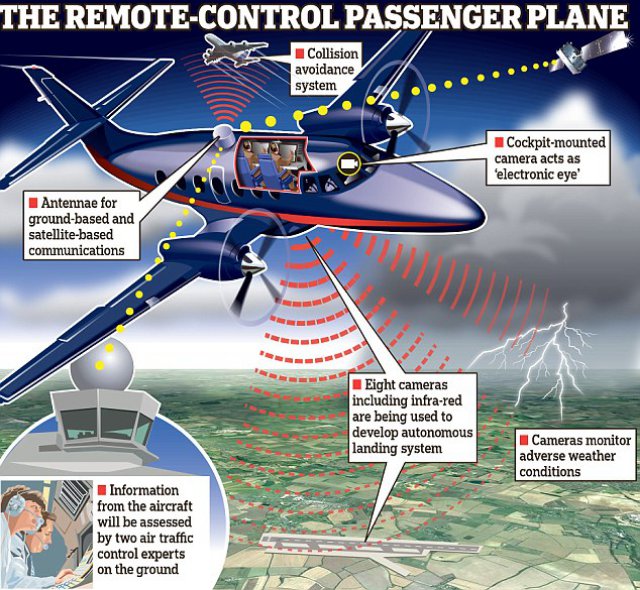 Engineers at BAE Systems have already launched a series of test flights in which the high-tech prototype flies by itself using computers while being monitored by operators sitting 15,000ft below it.BAE, which hopes it can open the door to unmanned flights in commercial travel, has transformed a small aircraft that normally holds 16 people into a flying test room. Instead of a pilot and co-pilot, the Jetstream 31 is controlled by a sophisticated infra-red camera known as the ‘electronic eye’ in the cockpit.Aided by seven cameras on the plane’s undercarriage, the system will allow the aircraft to undertake emergency landings by finding suitable stretches of land. It can also detect different cloud types, allowing the plane to fly around poor weather conditions.It is hoped the £400,000 test programme proves that larger unmanned craft can travel safely in open airspace alongside traditional planes.While the plane is ultimately expected to complete its course using technology alone, the current system requires a pilot on the ground to monitor the flight. Using satellite technology, the pilot communicates with air traffic controllers and sends directions to the plane, which has a top speed of 282mph.The current series of test flights, with the planes flying 300 miles from Warton in Lancashire to Inverness, use two pilots to assist the aircraft’s take-off and landing.A team of engineers monitors the on-board computer system over the 90-minute journeys, while an observer helps the remote pilot.The possibility of introducing unmanned flights to British civil air space was instigated more than ten years ago by a government-funded consortium of companies, including BAE. When funding was cut in 2013, BAE largely took over control of the programme.The company has a vested interest in relaxing the rules about flying unmanned craft in British air space. It is currently forced to undertake test flights of the Taranis, a pilotless fighter jet developed in a £185 million programme with the Ministry of Defence, in Australia. By moving the operation closer to its base in England, BAE bosses believe it can speed up the development and cut costs. Maureen McCue, of BAE Systems, said: ‘Our priority as always is to demonstrate the safe and effective operation of autonomous systems. We are working towards the possibility of flying our own unmanned systems in a highly controlled environment in the UK.‘The trials are an exciting time and will give us technology options that could be applied to our own manned and unmanned aircraft as well as potentially enabling us to take some new unmanned aircraft technologies to market.’
Engineers at BAE Systems have already launched a series of test flights in which the high-tech prototype flies by itself using computers while being monitored by operators sitting 15,000ft below it.BAE, which hopes it can open the door to unmanned flights in commercial travel, has transformed a small aircraft that normally holds 16 people into a flying test room. Instead of a pilot and co-pilot, the Jetstream 31 is controlled by a sophisticated infra-red camera known as the ‘electronic eye’ in the cockpit.Aided by seven cameras on the plane’s undercarriage, the system will allow the aircraft to undertake emergency landings by finding suitable stretches of land. It can also detect different cloud types, allowing the plane to fly around poor weather conditions.It is hoped the £400,000 test programme proves that larger unmanned craft can travel safely in open airspace alongside traditional planes.While the plane is ultimately expected to complete its course using technology alone, the current system requires a pilot on the ground to monitor the flight. Using satellite technology, the pilot communicates with air traffic controllers and sends directions to the plane, which has a top speed of 282mph.The current series of test flights, with the planes flying 300 miles from Warton in Lancashire to Inverness, use two pilots to assist the aircraft’s take-off and landing.A team of engineers monitors the on-board computer system over the 90-minute journeys, while an observer helps the remote pilot.The possibility of introducing unmanned flights to British civil air space was instigated more than ten years ago by a government-funded consortium of companies, including BAE. When funding was cut in 2013, BAE largely took over control of the programme.The company has a vested interest in relaxing the rules about flying unmanned craft in British air space. It is currently forced to undertake test flights of the Taranis, a pilotless fighter jet developed in a £185 million programme with the Ministry of Defence, in Australia. By moving the operation closer to its base in England, BAE bosses believe it can speed up the development and cut costs. Maureen McCue, of BAE Systems, said: ‘Our priority as always is to demonstrate the safe and effective operation of autonomous systems. We are working towards the possibility of flying our own unmanned systems in a highly controlled environment in the UK.‘The trials are an exciting time and will give us technology options that could be applied to our own manned and unmanned aircraft as well as potentially enabling us to take some new unmanned aircraft technologies to market.’
Source: Daily Mail
